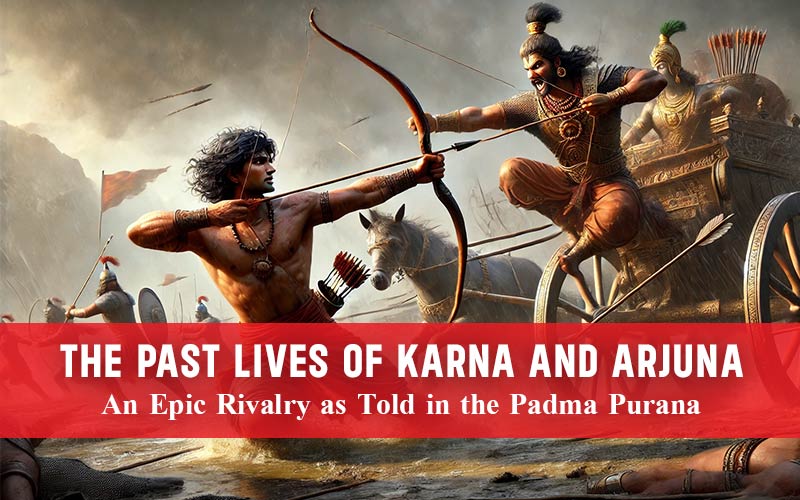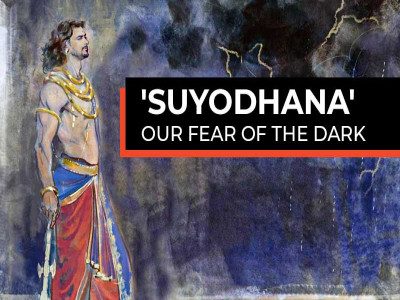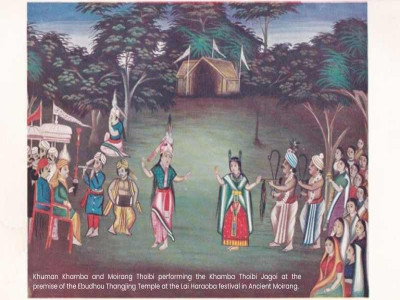
The Past Lives of Karna and Arjuna: An Epic Rivalry as Told in the Padma Purana
The Mahabharata, India's grand epic, is filled with tales of heroism, valor, and intense rivalries. One of the most captivating rivalries is that between Karna and Arjuna, two legendary warriors bound by fate and destiny. The Padma Purana offers a profound explanation of their unyielding animosity, tracing it back to a past life where the seeds of this rivalry were first sown. In Chapter 14 of Srishti Khanda, Rishi Pulastya reveals the backstory of Karna and Arjuna’s rivalry to Bhishma, explaining how their current enmity was shaped by karmic connections from previous births.
The Question That Puzzled Bhishma
Bhishma, the venerable grandsire of the Mahabharata, was one of the few who understood the relationships and histories between the various characters on both sides of the Kurukshetra battlefield. However, even Bhishma was bewildered by the fierce rivalry between Karna and Arjuna. Despite his wisdom, he could not understand why Karna harbored such resentment towards Arjuna, who, for his part, had done nothing to provoke Karna’s wrath. Karna’s fierce ambition to surpass Arjuna and prove himself as the greater warrior seemed relentless, to the point that, even after discovering Arjuna was his brother, he could not put aside his desire to defeat him. This left Bhishma with a burning question: what lay at the root of Karna’s seemingly inexplicable rivalry with Arjuna?
Driven by his curiosity, Bhishma sought answers from Rishi Pulastya, a great sage known for his knowledge of ancient histories and cosmic mysteries. Bhishma asked the sage to explain why Karna and Arjuna were locked in a rivalry so deep that it seemed to define their very existence.
Pulastya’s Revelation: The Story of Past Lives
Rishi Pulastya, moved by Bhishma’s earnest curiosity, began to recount a tale from ages past, describing how Karna and Arjuna’s conflict was not confined to their present lifetimes. According to Pulastya, their rivalry was the continuation of an unresolved enmity from a previous incarnation, where they had once lived as two powerful individuals. Their lives in this former age were marked by intense competition and a desire for supremacy over one another.
In this earlier birth, they were formidable opponents who, through a series of events and misunderstandings, had developed a deeply rooted hatred. Arjuna was widely recognized as the incarnation of Nara, a sage and a divine companion of Narayana (an avatar of Vishnu), while Karna was the demon Sahasrakavacha. Sahasrakavacha was a powerful being defeated by Nara and Narayana in a prolonged battle where each would alternate to rest and fight. The demon's rebirth as Karna symbolizes the unresolved conflict between divine and demonic forces in mortal life. Additionally, Karna’s divine parentage as the son of Surya, the Sun God, suggests his connection to celestial origins, though his life is marked by tragic circumstances and inner conflicts. The karmic debt, Pulastya explained, was so potent that it bound them together across lifetimes, ensuring they would meet again as rivals.
The Karmic Bond Between Karna and Arjuna
In this life, Karna and Arjuna found themselves on opposite sides of the great conflict, the Kurukshetra War. Karna’s loyalty lay with Duryodhana, while Arjuna was a central figure of the Pandavas. Despite his unwavering loyalty to Duryodhana, Karna’s actions were often influenced by his deep-rooted desire to challenge and surpass Arjuna. Pulastya’s story helps explain why, even after learning of his kinship with Arjuna, Karna could not overcome his drive to defeat him in battle. The karmic forces that had once fueled their rivalry were still active, influencing Karna’s every choice and action.
The Padma Purana’s revelation highlights how the karmic bond between Karna and Arjuna influenced their lives in subtle yet significant ways. Each encounter on the battlefield, each moment of rivalry, and every decision Karna made to undermine Arjuna was part of a much larger, timeless narrative. This perspective casts their relationship as part of an epic cycle of competition and retribution that transcends the constraints of a single lifetime.
Symbolism and Lessons of Their Rivalry
The story of Karna and Arjuna’s past-life enmity offers several profound lessons about karma, destiny, and the complexity of human relationships. In Hindu philosophy, karma is often seen as an inescapable force that binds individuals to the results of their actions, thoughts, and intentions, spanning beyond their present life. For Karna and Arjuna, their rivalry was a karmic bond that couldn’t be severed, even by the discovery of brotherhood.
The narrative also speaks to the idea of dharma (duty) and the difficulty of adhering to it when karmic forces come into play. For both warriors, fulfilling their destinies meant facing one another on the battlefield, representing how personal ambition and unresolved emotions can clash with one’s larger purpose. Karna, though noble and honorable in many ways, was driven by his karmic compulsion to prove himself superior to Arjuna, ultimately choosing rivalry over reconciliation.
The Influence of Past Lives on Present Decisions
This timeless rivalry between Karna and Arjuna is a reminder of how past actions and unresolved desires can profoundly influence present behavior. Rishi Pulastya’s revelation to Bhishma illustrates that the events of the Mahabharata were not only the result of present circumstances but also the culmination of long-standing karmic connections. Karna’s single-minded desire to overcome Arjuna and Arjuna’s role as the Pandavas' primary warrior were manifestations of karmic imprints that had to be played out.
Legacy and Significance of the Padma Purana’s Tale
The tale from the Padma Purana enriches the story of Karna and Arjuna by adding a layer of cosmic context, emphasizing how destiny and karma intertwine in complex ways. It also shows that even the most powerful warriors are not exempt from the consequences of their past lives, and they, too, are subject to the bonds of karma. Their rivalry, viewed through the lens of the Padma Purana, is not merely a clash of skill or ego but a profound reminder of the unseen forces that shape our lives.
In the end, the enmity between Karna and Arjuna serves as a powerful illustration of the intricate play of karma, dharma, and destiny, themes central to Hindu philosophy. The story reminds readers and listeners alike that actions in one life ripple across time, leaving an imprint that can reemerge in unexpected ways. For Karna and Arjuna, their fate was to clash, but their story leaves a legacy that continues to resonate, inspiring awe and reflection on the mysteries of existence.
Disclaimer: The opinions expressed in this article are those of the author's. They do not purport to reflect the opinions or views of The Critical Script or its editor.

Newsletter!!!
Subscribe to our weekly Newsletter and stay tuned.

















Related Comments